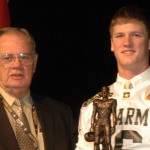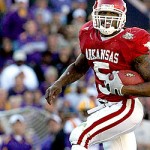
The Identity Theft of Mitch Mustain opens with a home video of Mustain as a small child playing football in his yard, just as millions of other children did at the same age. Nolan Richardson’s voice narrates over the raw footage, describing sports in the most innocent terms. “Sports are good!” he exclaims, citing the important role sports can have in teaching teamwork and organization and so on and so forth.
Then, the movie spends the next 90 minutes apparently trying to disprove that theory.
The story involves most of all the worst parts of college sports. The filthiness of recruiting. Coaches pushing their own agendas at the expense of their players. Inappropriately meddlesome boosters. Media and fans twisting teenagers into demigods. Power, corruption, deceit, influence, ambition. It’s all very Game of Thrones, with the Broyles Center taking place of the Iron Throne and everybody forgetting that the point of high-level college football is the crystal football. And no dragons.
It’s red meat for those that despise the extravagance of big-time college athletics.
The movie is well-done. Interviews with Mustain, several members of the Arkansas media and a few others are inter-spliced with old game and news footage. Those who have followed the story closely through the years may not find much new information (although Mustain’s description of former USC teammate Mark Sanchez was an unexpected highlight), but it does provide an interesting perspective on who Mustain was and is and how he’s dealt with the events that, at least to many people in his home state, will always define him.
This, in effect, is where the title of the film comes from. That Mustain, regardless of what actually happened in those tumultuous years in Fayetteville or will happen in the future, has been strongly defined one way or the other by nearly everyone in Arkansas and around the country who’s ever heard some piece of his story. The film even features quick clips from locals around what is presumably the Fayetteville area giving their varied opinions on the quarterback. To the public, Mitch Mustain is much like a one-hit wonder band. Regardless whatever happens, the Hanson boys will always be the kids responsible for “MMMBop”.
But the title is also somewhat of a misnomer, as Mitch Mustain doesn’t come across at somebody stuck in a cage of the world’s expectations. He comes across as a 25-year old still searching for his own identity. Some kids, as Mustain describes USC quarterback Matt Barkley, have their future figured out when they’re small kids. Some people figure out who they are in college, and some people are well into their 20s before they figure it out. The end of the movie focuses on the many different things Mustain has tried his hand at doing since leaving USC, which include professional baseball, selling cars, and his current role as an Arena League quarterback. He doesn’t come across as angry, bitter, or regretful. He comes across as a young guy trying different things out.
Mitch Mustain is frequently described in the film as having difficulty being a high-profile quarterback without having the personality of a typical jock. He’s described as a shy, introverted guy who is interested in things like military history and broader culture, who just happens to be good at this thing called football. That’s understandable.
But even though football may not be his primary interest, he’s still clinging to it after he’s had several opportunities to remove himself from it. Playing in the Arena League suggests he either actually loves football quite a bit, or at least finds the lifestyle comfortable. He’s obviously free to leave the sport behind and use his degree in international relations to begin a different type of career for himself, but he’s choosing to continue playing the sport with which most people identify him with. And good luck to him for that.
If anything, you leave the movie just hoping Mustain is eventually able to figure out what he wants to do and put the insanity of his past behind him.
It’s very easy for people to look at someone like Mustain and try to pinpoint exactly what it is he should do with his life. It’s something we do all-too-frequently with recruits choosing colleges as well as generally every public figure facing a choice. But no matter what we think of Mustain playing Arena League football or selling cars or talking about joining the military, it’s up to Mustain to figure that out for himself, just as it is for all of us.
Our identities are not something that just happens instantaneously, even if others may define us by one action. A person’s true sense of self is developed slowly over time. Mustain’s life experiences aren’t normal. They’re not even normal for a high-profile quarterback. It’s a unique story that’s taken him time to make sense of it all. Mitch Mustain is a young man trying to figure out what he can do with his life. His identity hasn’t been stolen. It’s still being developed.
I watched it with The Wife, who lived through the story as a fan along with me. I asked her if the movie made her feel any differently about Mustain or his saga and she said that it did. She feels she has a much more thorough understanding about the story and sees Mustain in a much more positive light.
Overall I think it’s a good movie. Even if you think you know the whole story, it may still be worthwhile to see it. If nothing else, it is interesting to see Mustain openly discuss the whole thing. Recommended.
One really big pet peeve I have with this saga, and it was relied on heavily in the film, is the reference to Mustain being 8-0 as a starter. While that’s technically true in the same sense that it’s technically true to argue Tim Tebow led the Denver Broncos to the second round of the NFL Playoffs, it doesn’t exactly tell the entire story.
Yes, Mustain showed flashes of greatness as a freshman (Vanderbilt, Ole Miss, and the game-winner to Ben Cleveland against Alabama), but he also had his share of struggles on the field. Infamously, he only threw one pass in the eighth victory over South Carolina. It’s not like he was playing really amazing football, threw a pick and then was pulled that night in Columbia (to his credit, Mustain admits as much in the film).
Can we please give more credit to Darren McFadden for the success of 2006? From the Auburn game on, McFadden became a legend that season, earning his first of two Heisman runner-ups. I know we all know that. But McFadden and Felix Jones only received a couple of passing references in the movie. Specifically, that Carolina game was one of McFadden’s greatest games as a Razorback.
Mustain deserves his credit for what he did well on the field that year, but so does McFadden, Jones, Hillis, Monk and everybody else. All the more reason for McFadden and others to be featured on some sort of in-stadium ring of honor-type designation.
Okay, that’s it. Rant over.
UPDATE: I’ve gotten several questions about this and I want to make it clear: at no point in the movie does Mustain actively promote that he was 8-0 and/or that pulling him was a mistake. At no point does he take credit from anybody else for those victories – he doesn’t even give credit to himself. Mustain comes across well in the film and is very humble about the 2006 season. He describes himself as “trying to keep [his] head above water.” He does mention the rest of the team as being key to the 10 wins the team earned that season, and even that he never believed he was the best option to quarterback the team that year.
This rant is directed not towards Mustain, but to any fan or media member (some of whom are included in the movie, many of whom are not but easily found on message boards and social media) who point to the 8-0 stat as definitive proof that Mustain was the trigger for that team’s success. There were, remarkably, 14 NFL Draft picks on that team. It was one of the most loaded Arkansas teams since joining the SEC. Mustain was a big part of many of those victories, but it was much more than any single player. He admits as much.
In other words, this isn’t even directed so much at the movie, but to anyone still using this general talking point. If Mustain’s story was still a timely topic on a routine basis, I’d save this for that time, but this story doesn’t come up as often as it used to, so I wanted to make sure I got this out. And it is referenced in the film, so I felt it was apt.
Doc Harper is the managing editor of Arkansas Expats and is a regular contributor to College Football News and Sporting Life Arkansas. You can email him here and follow him on Twitter @doc_harper.











